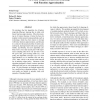Free Online Productivity Tools
i2Speak
i2Symbol
i2OCR
iTex2Img
iWeb2Print
iWeb2Shot
i2Type
iPdf2Split
iPdf2Merge
i2Bopomofo
i2Arabic
i2Style
i2Image
i2PDF
iLatex2Rtf
Sci2ools
129
click to vote
ICML
2001
IEEE
2001
IEEE
Off-Policy Temporal Difference Learning with Function Approximation
We introduce the first algorithm for off-policy temporal-difference learning that is stable with linear function approximation. Off-policy learning is of interest because it forms the basis for popular reinforcement learning methods such as Q-learning, which has been known to diverge with linear function approximation, and because it is critical to the practical utility of multi-scale, multi-goal, learning frameworks such as options, HAMs, and MAXQ. Our new algorithm combines TD() over state?action pairs with importance sampling ideas from our previous work. We prove that, given training under any -soft policy, the algorithm converges w.p.1 to a close approximation (as in Tsitsiklis and Van Roy, 1997; Tadic, 2001) to the action-value function for an arbitrary target policy. Variations of the algorithm designed to reduce variance introduce additional bias but are also guaranteed convergent. We also illustrate our method empirically on a small policy evaluation problem. Our current resu...
ICML 2001 | Linear Function Approximation | Machine Learning | Reinforcement Learning Algorithms | Reinforcement Learning Methods |
Related Content
| Added | 17 Nov 2009 |
| Updated | 17 Nov 2009 |
| Type | Conference |
| Year | 2001 |
| Where | ICML |
| Authors | Doina Precup, Richard S. Sutton, Sanjoy Dasgupta |
Comments (0)

